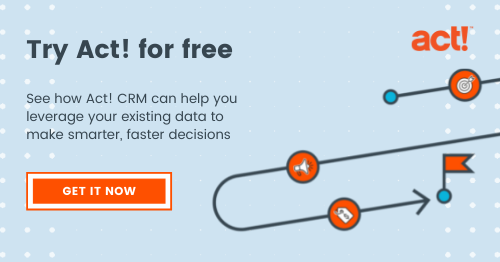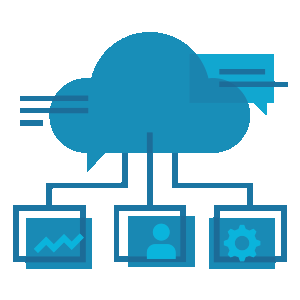
It’s tempting to think that a Big Data strategy is just for big businesses. However, data can provide tremendous value to any company of any size or type, and should be considered an asset that drives your business forward. With the right data, you can understand your customers on a deeper level, improve business operations, and drive more sales. In fact, one study found that companies that leverage big-data analytics enjoy 15% more sales than companies without these tools.
To enjoy these benefits, you need a good data strategy, which is an organized approach to identifying what kind of data you need to support business goals. Your data strategy should also determine where the data will come from, where it will be stored, and which tools you’ll use to analyze it and turn it into valuable business insights.
Don’t make data an afterthought
With so many demands these days, it can be hard to know why you should prioritize a data strategy. On the other hand, it’s also easy to get over eager and invest in complicated technologies that don’t fit your business needs. For instance, an overly robust (and expensive) customer relationship management (CRM) solution, with an overwhelming number of features, may exceed the needs of your smaller business.
If it becomes too burdensome, you may delay creating a data strategy until you have more time to focus on it. As we all know, that time almost never comes unless we prioritize it. This is why it’s important to spend time identifying your core business needs and goals so you can create a realistic data strategy going forward.
What are the benefits of a data strategy for professional services?
Move from reactive to proactive business management
We all know that 2020 was far from normal, and it seemed like every aspect of our daily lives was a reaction to the chaos brought on by the pandemic. However, even in “normal” times, many professional services tend to operate in a reactive mode rather than plan strategically for the future. However, the importance of proactive management, especially in challenging and unpredictable times, can’t be underestimated because reactive management is one of the top ten reasons small businesses eventually close their doors.

Here’s an example of proactive management in the real world: Consider a group of local produce growers who are planning ways to adapt their crops to extreme weather events brought on by climate change. This might involve research and data about crops that are better suited to hotter and drier growing conditions, as well as more efficient water and soil conservation practices. Not only is this kind of proactive approach better for business survival, it is likely more profitable. In a case like this, the growers can use data to not just determine which vegetables grow best under certain conditions, they can also analyze yields, customer preferences, shelf life, profit margins, and more.
A good data strategy can help all kinds of businesses analyze real-time, existing data to move from reactive mode to anticipating the needs of the business and customers, suppliers, partners, and of course, the business itself. Ultimately, a proactive approach can reduce costs, nurture existing customer relationships, build brand awareness, and increase profitability.
Create a more strategic and data-driven online presence
Creating an effective online strategy requires an effective data strategy. All too often, smaller businesses treat their social media pages like they do their personal pages — posts are more random than planned, and may not support a larger brand or product campaign.
To build an effective online strategy through your web site and social pages such as Facebook, Instagram, Twitter, Pinterest, or LinkedIn, you have to use data captured through those sites. This will help you understand who is visiting your pages and where they spend the most time. You can also identify most frequently viewed or downloaded content as well as search engine optimization (SEO) keywords that drive the most traffic. (In fact, effective SEO is estimated to drive 1000%+ more traffic than organic social media.) All of these insights will help you identify content to create that will best engage your audience and boost conversion rates.

Improve your product and service offerings
Even if you have a wildly successful portfolio of products and services today, how do you plan to keep that going in the future? How will you learn what customers want, what they like, what could be better, and which new offerings will help you stay competitive down the road?
This is where a good data strategy is indispensable. Data analytics can help improve the quality of your existing products with an eye to where the market is heading. You can look to various sources of data for this information, such as sales and inventory data, competitor offerings, customer service logs, and even customer reviews on your social media pages and review sites such as Yelp and Google. Improving products and services, enhancing customer service, and increasing customer retention rates are some of the best ways professional services can benefit from big data analytics.
Discover the advantages of predictive analytics
Customer acquisition cost (CAC) and customer lifetime value (CLV) are two important metrics that can help businesses better allocate resources to improve customer retention and drive repeat purchases. As some analyses have shown, acquiring a new customer can cost five times more than retaining an existing customer. This is why companies are constantly trying to reduce their CAC while improving the ROI of their marketing efforts. This includes marketing to existing customers to help boost CLV, which measures the value of an entire customer relationship, not just their individual purchases.

What does all of this have to do with predictive analytics? Predictive analytics can give businesses tremendous visibility into customer behavior through extracting data-driven insights from past customer decisions to predict future behavior. With this type of “crystal ball” approach, companies can drastically improve their decision making and better determine where and how to focus their marketing and sales efforts. For instance, the company may need to dramatically shift its business strategy and focus on a new demographic to acquire new customers. Or, they may be losing customers to a competitor who offers lower prices or a more compelling loyalty program. Whatever the case may be, predictive analytics can help professional services by identifying areas of improvement to gain a competitive advantage and significantly boost brand awareness and profitability over the long term.
Drive productivity with easily accessible data
There’s no end to the productivity benefits your business can gain when team members have access to the right data at the right time. For instance, INEX, a long-term Act! customer, enables all team members to update and access customer account information wherever they work. With access to a “single source of truth” about the customer, even a new employee can spin up quickly and fully engage with the customer — all without spending any time with the previous account owner to learn about the customer’s history. Not only does this save employee time, it improves customer service by ensuring every interaction is seamless and well informed.
Click here to learn how INEX uses a CRM to provide its remote employees with access to real-time data to improve decision making, collaboration and workflow.
Of course, your data strategy and data sources can and should account for more than just customer service and marketing information. You should also consider a process that makes it easy to update hardware and software inventory for accounting and management purposes. This can also ensure you or your IT team replaces worn-out or outdated computers before they fail and cause employee downtime. You might also use data to maintain stock inventory, so you can automatically replenish products when inventory falls below a certain threshold. There’s no limit to how data can help companies including optimizing delivery routes, improving hiring and onboarding processes, and much more.
Continuously develop, refine, and meet your marketing goals
We’ve already talked about how data can help your business better understand your customers, increase customer satisfaction, improve products, and stay ahead of trends. But with the right CRM platform, you can store and harness all of that data to optimize your marketing efforts and refine your marketing strategy, too. For instance, CRM data analytics can deliver ongoing insights and help you make better decisions around your content marketing, email marketing, social media marketing, product pricing, sales promotions, customer relationships, loyalty programs, and much more. As a result, you can make strong, data-driven business decisions backed by robust business intelligence to improve your bottom line.
Big Data is not just for big businesses anymore
The good news is, there are many CRM and data analytics tools that fit the needs and budgets of smaller professional services businesses. You can now choose from desktop and cloud options with pay-as-you-go subscription plans, both of which are affordable and scalable. The other advantage is that you can learn as you go, so you can add on more advanced features as your business needs evolve. If creating a data strategy has seemed out of reach until now, it’s time to take another look at solutions like Act! CRM that are specifically designed to meet the needs of professional businesses like yours.
If you don’t already have a data strategy or data management, now is the time to create one. Download our SMB Guide to Creating a High-Value Data Strategy to learn how!




